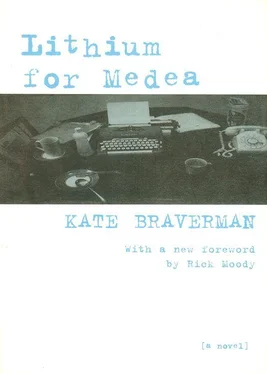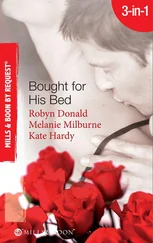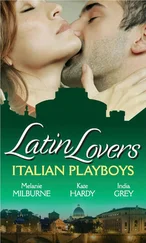We share the same blood. There are blood truths. I am certain of that. There exist connections of awesome power and subtlety more ancient and virulent than you might at this point imagine.
Have you thought of me often? I ask simply because I feel the presence of things, a kind of chorus. I’ve felt it all winter.
I understand when you say your mother is difficult beyond normal expectation, beyond even the bounds of that antiquated concept some men once called decency. I have an appreciation for your situation. Aren’t our mothers identical twins?
You ask why they scorn each other. I think it is simply that they cannot bear the undeniable stain. They must deny it. It is necessary for them that they despise each other. They have not even spoken in twenty-five years. They nest on opposite shores of this country as if the three thousand miles between them was a tangible demonstration of free will. I don’t think anything is free.
Is your mother bleaching you clean of Poland? Of horse paths through the firs? Ritual baths and superstition? Of course she is difficult to communicate with. Her Ph.D. in sociology protects her from the root-truths. Doesn’t she realize her doctorate is simply a modern piece of witchcraft?
My mother also denied me our exquisite and painful history. I believed I had a holy right to our shared past. I knew it wouldn’t be given. I took it.
How will you take it, you wonder? There are no maps for this, no dress rehearsal. One empties the self of past latitudes. The arms can become sails. The self is the projectile. Do you follow me?
What do you know of our terrible shared history? The rot they do not speak about? Even now with their names clean and Anglo-Saxon, certain truths are sealed shut in their mouths, too dangerous, too dark and taloned to utter. In their way, they are still spitting the evil eye in claustrophobic dark Sabbath rooms.
You know by now (your mother has told you?) they were not orphans. Our grandmother still lives. That’s where I saw your photograph. Our mothers pretend that she is dead. It is easier for them to believe this than to bear the simple truth of her alive, crippled (and have you heard it said demented?), in a Bronx tenement, living in her self-imposed hell, still punishing herself for the one terrible indiscretion. I am talking about the one virgin night she spent with the man, the infidel, the Christian who took her girlhood and left her pregnant with the twin curse that is our mothers.
Our grandmother named them Frieda and Fay. Later and separately, as they created new lives for themselves, they became Francine and the Felicity you know well.
Our grandfather was named Edward. I hired a private detective for this. Edward Geoffrey Richmond, though the name is meaningless and he is dead. He died a wealthy man in Houston, Texas, in 1964. I saw his grave.
He was married five times legally. There’s no way to count the liaisons he had. His pattern was always the same. He was attracted to very young women of what was then called the lower classes. Our grandmother wasn’t the first. She was simply one so deprived, so impoverished and terrified in this raw country of factories and sweatshops, of trolley cars and gray skyscrapers blotting out the clouds, that she had no recourse at all.
Edward Geoffrey Richmond probably never even knew his seed beat with life. (Two lives, in fact.) He has sets of bastards scattered across America. The detective said there could be as many as twelve children.
I met one, once. The private detective found her for me. She was tall, as we all are. She had the same giddy brilliance. She was vice-president of a bank in Boston. She was the bastard daughter of this man Edward. Her mother had been a fifteen-year-old Russian immigrant, much like our own grandmother Rose. She, too, was deserted in infancy.
She didn’t seem surprised to see me, just as I am not really surprised by your letter. There are forces pushing toward order. I am certain of that now.
This woman, this half-aunt, took me to lunch in a glass citadel with chilled white wine and the city sparkling and fresh as a new-dug grave below us. She sipped her wine slowly, without bitterness.
Rachel, they are such Calvinists. Your mother Felicity with her professorship. My mother Francine. The bastard daughter bank president in Boston. America has ruined them. This half-aunt sipped her wine and spoke without longing or anger about her childhood of cots and poverty. She even offered the hypothesis that early suffering can lead to extraordinary achievements.
I could see that she could not bear the pain of me, my eyes, the something in me she recognized. There seemed little to say. I stood on the street with my half-aunt. The search had, for me, ended.
It was different with our grandmother Rose. I will tell you more about her later. I can give you her address. You can learn from her. She’s a witch, in her way, red-haired as we all are. She would sense in you the dark amber eyes (almost coral, like the buds of certain orchids) and the erratic heartbeat, one of her own.
But you cannot journey in your condition. A serious journey requires preparation. Eat and sleep. You will need strength, no matter what. Perhaps by summer you will be ready. Remember, nothing is promised. Even the ground we walk upon is tentative, a mere approximation of something else.
I await word of your increasing health. We will share the blood-truth. I sense this.
I folded the letter carefully in an envelope. I had to mail it immediately or it would just sit there in my house amid the other remnants and relics of the lives I have led.
I mailed the letter and let myself wander slowly toward the ocean. The waves were gray. And I thought, don’t die, white-haired father, you who have been beaten gray as rock. You are but momentarily becalmed. Winds will rise. The whitecaps will dance again, star haunted. You will mount the stern gray crest again. You will know the liquid mountains. Just keep breathing.
Then the gray sea was lost, engulfed by a gray haze, the first tentative claw of night. Somewhere on the sand a man began singing something like an Arabic prayer. I remembered the day I moved into the Woman’s House.
“I love you,” I whispered in my new darkness.
“Why?” Jason asked.
He was lying on his back, lying on the brand-new flower-print sheets I had bought, lying with his arms raised above his head, resting loosely on the new down pillow. The bedroom curtains were open. It was summer. Jason had strung rows of neon Christmas bulbs outside the window. The bedroom was washed by silver. It always looked like a full moon.
“You are my dark one. My solitary one. You are my longed for and absolute in black marble. You are onyx. We skate down the iris night, one body. We map the black warm flesh openings. Your tongue is moss. You are a flutter of wings and hemp smoke. Your breath is sweet lime. Your sighs are like a drum, a tree falling down. You are my charmer, my fire-eater, my wind-rider. You are the cloud dance.”
“I know,” Jason said. He turned and faced the wall. “I don’t want that much love.”
I willed myself to lie still in the darkness. It was summer. I had watered the backyard garden. I had fluffed the pillows, straightened the bedspread, swept the floor.
“Why does my love terrify?”
“You want so much in return,” Jason said.
I sat up. It was our first night together officially. I wanted to open drawers and find flowers. I wanted to be carried over the threshold. I wanted some tangible demonstration that he wanted me there, some proof, some hard evidence.
“There’s no room for all that junk,” Jason repeated, over and over, while I dragged cardboard cartons up the three front steps, across the porch and into the living room. Jason watched the boxes collect, one on top of the other. He stared at them with a mounting horror, as if he had expected me to enter his life naked, empty of everything, a stretched canvas ready for the brush. I carried boxes and he looked angry. Jason looked betrayed.
Читать дальше












